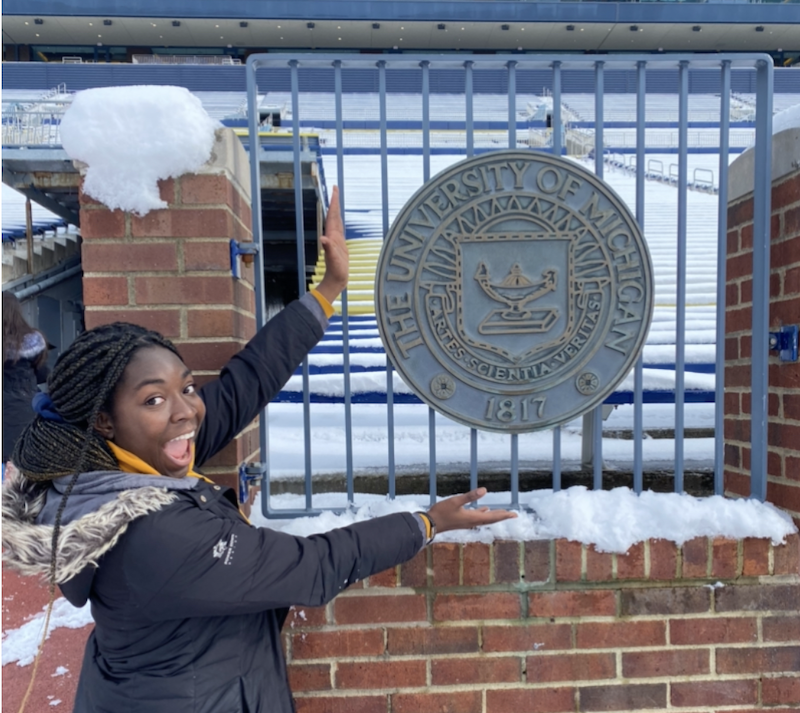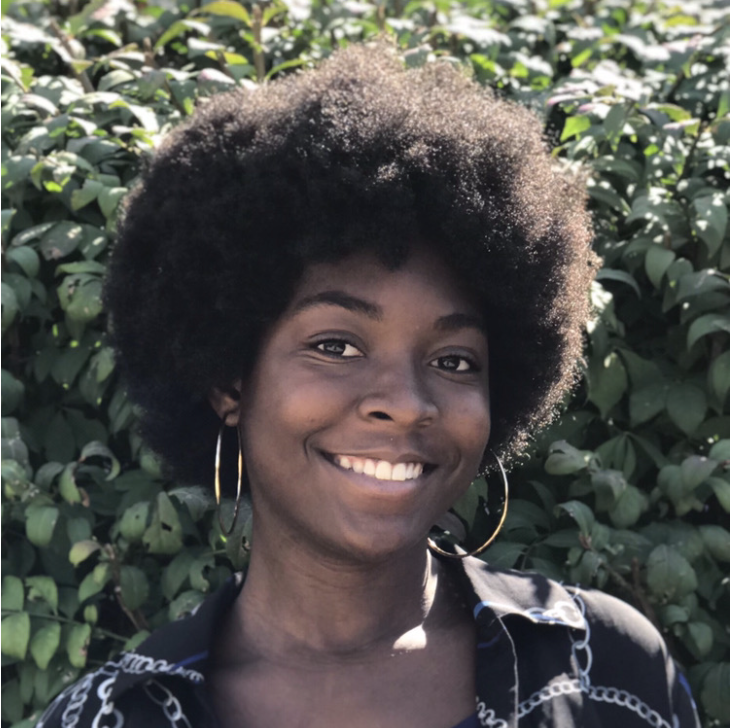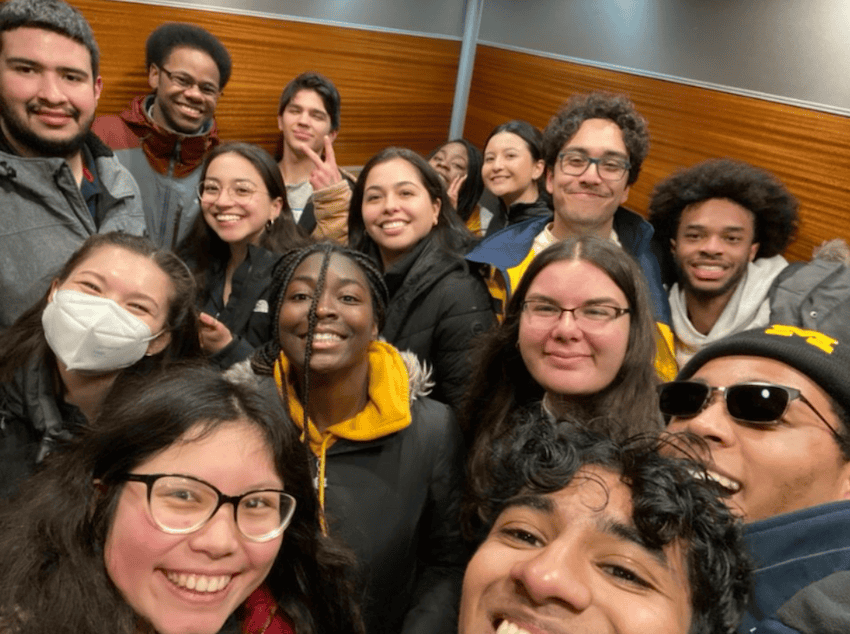
Q&A with U-M IOE Undergrad Oluwakemi Johnson
Oluwakemi Johnson speaks about her experience as a Posse Foundation Scholarship recipient, a University of Michigan IOE DEI Committee member, and how she found her way to the U-M IOE degree program.

Oluwakemi Johnson speaks about her experience as a Posse Foundation Scholarship recipient, a University of Michigan IOE DEI Committee member, and how she found her way to the U-M IOE degree program.
Oluwakemi Johnson is an undergraduate in the U-M Industrial and Operations Engineering (IOE) department. She’s currently is a part of the National Society of Black Engineers and the U-M IOE department’s Diversity, Equity, and Inclusion Committee (DEI). Oluwakemi speaks about her experience as a Posse Foundation Scholarship recipient, a DEI Committee member, and how she found her way to the U-M IOE degree program.

Favorite IOE class: IOE 333 Ergonomics
Favorite place to study on campus: Random conference rooms across campus
Favorite place to get food near campus: Ahmo’s in Pierpont and Chapala
Tell me about yourself and the organizations that you are a part of on campus!
I’m a junior majoring in Industrial & Operations Engineering. I came to the University of Michigan on the Posse Foundation Scholarship, and I have been really enjoying my time here! Freshman year I joined the National Society of Black Engineers (NSBE) and the African Student Association (ASA). I’m also on the U-M IOE DEI Committee; as a part of that I’m running their Community Dialogue Series – we actually just had one with Dr. Damon Williams. Outside of engineering, I am super active. I love weightlifting and I play volleyball with a group of people that meet up a couple days a week.

Tell me more about the Posse Foundation Scholarship, that sounds like an amazing opportunity.
The Posse Foundation is a community-based leadership program that sponsors students’ college tuition and send groups of about 10 students to college together so that they can have each other as a support system. It started when a student dropped out of college and said, “If I had my posse with me, I never would have dropped out.”
I’m a part of a group of 10 students from Chicago that go to the University of Michigan and received the Posse Foundation Scholarship. We went through the pre-collegiate training program together, and we now have weekly and yearly meetings with the Posse staff. This foundation has given me these awesome possibilities in engineering and mentorship.
Tell me about the National Society of Black Engineers and what sort of things you guys do?
When I joined NSBE, my freshman year, I was on the junior executive board, so we were in charge of putting events together for the organization. We tried to do a lot but it was hard since my freshman year was the big lockdown year with COVID-19. But we worked hard and we did professional and social events with icebreakers and activities. Now I don’t have a specific position, but I attend the general body meetings as often as I can and it’s really fun. NSBE also partners with a lot of programs and companies so it has been a great opportunity for networking.
You’re also a part of the IOE DEI Committee, correct?
Yes! It’s really fun. I started the fall of my sophomore year because I was approached by one of the committee members. I was skeptical at first, because oftentimes, the stereotype of DEI committees is that they don’t get much done. But I was actually really pleasantly surprised with the U-M IOE DEI committee. I think we can get a lot done in the department because U-M IOE is a relatively smaller and close-knit major. We are still establishing ourselves, but we want to provide resources to students that need help with finances, mental health, education, and more. We would like to make sure that all U-M IOE students can afford to be here and take care of themselves. We also work to find ways for professors to create a safe and equitable space in their classrooms.
My big project has been the U-M IOE Community Dialogue Series. I personally don’t like listening to lectures or speakers very often, so I wanted to create an event that was more of a facilitated discussion where all of the attendees played an active role. The goal is to invite a wide range of speakers to the U-M IOE department. For example, our first speaker was Natalie Levy, who discussed negotiations and self-advocacy in the workplace. Most recently we invited U-M IOE alum Dr. Damon Williams from Georgia Tech to talk about creating connections with others and overcoming demographic differences. I’ve really enjoyed working on the series and getting to reach out to all of these impressive people.
How did you decide on IOE as your major?
I always knew I wanted to do engineering. When I came in as a freshman and I decided I wanted to do engineering physics. My interests quickly switched to computer science, but then I took CSE section of Engineering 101 and it just wasn’t for me. However, I took the IOE section of Engineering 100 and I really like it. I loved figuring out the best ways to optimize processes and increase profits and customer volume. It was so interesting to look at data and set goals and locate limitations in processes. I took a couple more classes and decided that IOE was what I really wanted to do. I found that I liked this side of engineering much more than the technical and building side of the engineering. I was worried about switching my majors but I went to the major declaration day and everyone was really nice and supportive!
What aspect of college has been the biggest challenge for you so far, and what has been the most fulfilling?

My biggest struggle has definitely been time management. In high school, I was one of those types of people who didn’t have to study hard and got by, and coming to college I realized I couldn’t succeed that way. My freshman year, along with the struggle of online classes, I had to figure out how to study and retain the information I was learning. I also had so many more responsibilities and I had to figure out how to find the time for all of it.
Google Calendar became my biggest resource – I love it so much. I would sit down and iron out my schedule and pick specific times for going to the gym, doing homework, doing self care, etc. I think the other biggest struggle was the culture shock of moving to a predominantly white institution (PWI). I couldn’t find an African market to get my cultural food from, or any restaurants, and I struggled with the change in demographics as well.
However, the connections I’ve made here have made a huge impact on me. Michigan is a really big school, but I have made a whole bunch of friends, all my professors know my name, and I have all my friends from my hometown that I still talk to as well. I can’t wait for my hometown friends and my university friends to meet each other. Overall, it has just been an amazing experience.